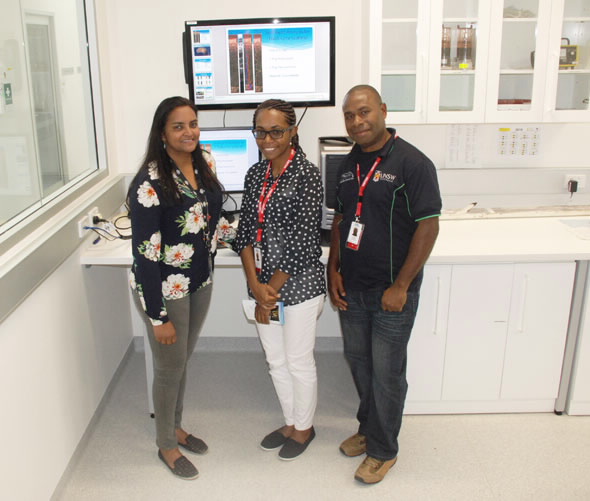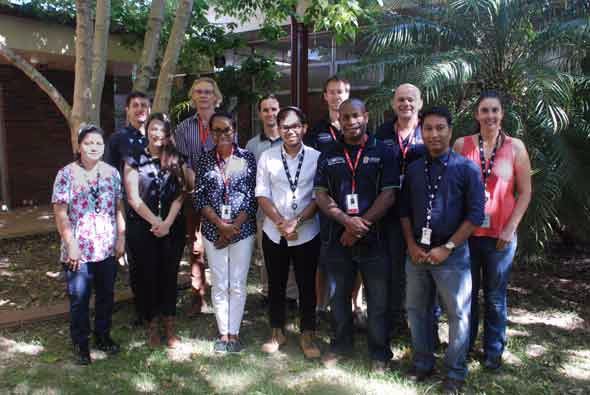Members of a collaboration from the University of New South Wales (UNSW) Australia and the National Fisheries Authority of Papua New Guinea (PNG) met recently at ANSTO to discuss progress on a major project to improve inland aquaculture in PNG.
 |
| ANSTO ITRAX Officer Patricia Gadd (left) with Lina Pandihau and Justin Narimbi |
After a warm welcome by the Head of Research at ANSTO, Dr Suzanne Hollins, and Dr Henk Heijnis, Leader Environment, the Australian Project Leader, A/Prof Jes Sammut of UNSW Australia, gave an update on the project’s progress. Some members of the group also took part in a series of training sessions to introduce them to nuclear techniques that are applicable to aquaculture research.
The main focus of the four year project, which is funded by the Australian Centre for International Agricultural Research (ACIAR) and the National Fisheries Authority of PNG, is to resolve constraints on the growth and sustainability of the aquaculture industry in an effort to improve food and income security as well as increase the social benefits from aquaculture in rural areas in PNG.
The ANSTO activities under the project are led by Dr Debashish Mazumder, Senior Research Scientist, who specialises in the use of isotopic techniques on environmental and aquaculture research.
He has been investigating technological bottlenecks associated with food and nutritional requirements for farmed fish that are important for the growth and sustainability of the aquaculture industry in an effort to improve food and income security. In addition the work is expected to increase the social benefits from aquaculture in rural areas in PNG.
The participation of representations from the Department of Fisheries, Department of Agriculture and Livestock, University of Technology, Lae and other institutions in PNG has been a crucial aspect of the undertaking, which includes post-graduate training for project members.
The partnership model also includes the UNSW, ANSTO and other organisations. A number of students are making a contribution.
Ms Lina Pandihau, Aquaculture Officer with the National Fisheries Authority, who represented the PNG Project Coordinator, Jacob Wani, expressed PNG’s appreciation to UNSW and ANSTO for their collaboration and opportunity to learn from other countries to develop the aquafarming industry while avoiding environmental impacts.
Justin Narimbi, a Lecturer at University of Technology, who completed his Master’s at UNSW with the joint supervision by UNSW and ANSTO, will be introducing isotopic techniques in PNG and working with team members to develop feeding strategies for aquaculture in PNG.
A/Prof Sammut, Australian Project Leader, said the project has completed its first year, during which strengths, weaknesses, opportunities and threats to inland aquaculture in PNG were identified.
“In partnership with ANSTO scientist Dr Mazumder, we are moving to a series of trials comparing fertiliser and formulated feed combinations as well as the use of agricultural by-products as ingredients to reduce production costs,” said Sammut.

The project is also scoping the potential to assess the human health benefits from consuming farmed fish in collaboration with the PNG Institute for Medical Research.
Sammut is optimistic that the capacity building, training, high standard of research that have been demonstrated so far will lead to further projects and collaboration in this very important rural industry.
Fish is an important source of animal protein for millions of people worldwide. The longer-term goal is to improve food and nutrition security of the rural population in PNG, whose dietary protein deficiency leads to malnourishment and growth problems. Around 80 per cent of the population is unemployed and live on less than $2 a day.
Sustainable fish farming, in harmony with other rural activities, is expected to provide opportunities for self-employment as well as support the growth of associated industries. Fish farming is also generating significant social impacts, including improving tribal cooperation, and assisting disadvantaged individuals.
Read more about the project:
ANSTO website
UNSW Australia website


